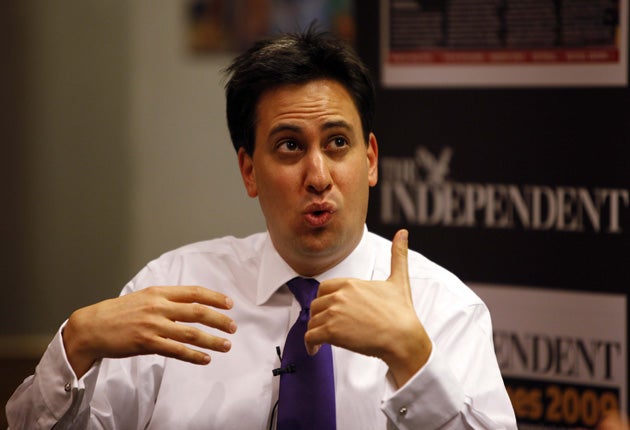I'm sympathetic to demands for electoral reform, says Miliband
Minister tells 'Independent' meeting there is a strong case for alternative voting

Ed Miliband last night joined growing Cabinet support for changing the voting system as he disclosed he was "very sympathetic" to electoral reform.
The Energy and Climate Change Secretary backed the alternative system under which MPs have to pick up more than half the votes cast to be elected.
He told a fringe meeting organised by The Independent: "I'm open to the idea of electoral reform."
Mr Miliband, who is in charge of writing Labour's election manifesto, said: "There is a strong case for AV [alternative vote] because it's a system under which MPs will be more accountable."
He joins Alan Johnson, John Denham, Jack Straw and Lord Mandelson, who have already backed electoral reform. Gordon Brown is now expected to include a paving bill in the Queen's Speech later in the year setting up a referendum on the issue.
Mr Miliband sidestepped questions on his leadership ambitions, saying it would be "presumptuous" to talk about landing the top job when he had been in Parliament for just four years. Instead, he put the battle against global warming at the centre of Labour's election campaign as he denounced the "sham greenery" of the Tories.
He signalled a drive to boost the party's standing on environmental issues – with the Liberal Democrats and the Green Party, as well as the Conservatives, in his sights – and told the packed meeting: "Green is a battleground we can win."
Mr Miliband argued that the Conservatives were instinctively unable to take the hard choices required to cut carbon emissions and invest in alternative forms of energy.
He said: "We intend to fight this election on climate change, like we'll fight it on the economy and public services."
His comments were also a recognition of the threat the party faces from the Green Party, which is picking up support from disaffected former Labour voters.
He admitted that the cost of both international and domestic flights would have to increase and said he had to "think very hard" before supporting a third runway at Heathrow airport.
"You have got to show that you can tackle climate change and maintain things that people see as very important in life. We don't want to go back to the 1970s in that sense."
He admitted that his father, the Marxist academic, Ralph Miliband, "would have disagreed with a lot of what the Government has done". However, he added that his father had never seen members of the Labour Party as "right-wing sell-outs".
Mr Miliband, a Treasury adviser to Gordon Brown for eight years, admitted a sense of disappointment over the position in which the party found itself two years after Mr Brown became Prime Minister.
"Things don't necessarily turn out the way you think," he told the meeting attended by more than 300 delegates.
He conceded mistakes were made by the Treasury as it failed to appreciate that "incremental changes" to the financial institutions were adding up to a "system out of control".
But he suggested Mr Brown's leadership when the crisis erupted would come to be recognised – whatever the result of next year's election.
Join our commenting forum
Join thought-provoking conversations, follow other Independent readers and see their replies
Comments
Bookmark popover
Removed from bookmarks